Disclosure: Meeple Mountain received a free copy of this product in exchange for an honest, unbiased review. This review is not intended to be an endorsement.
No collecting. No Deckbuilding. Just Play.
That’s written on the back of the box and it’s why I’m writing this review.
Hero: Tales of the Tomes, now known as Hero, is a card battler similar to titles like Pokemon, Hearthstone, and Magic: The Gathering. The main selling point is everyone draws from the same deck as opposed to everyone having their own personal decks.
This isn’t the first game to do this. A game I played long ago, Allegiance: A Realm Divided, also had an identical premise. Sadly, the publisher disappeared from the face of the earth, and getting a copy will quickly hit the three-digit pricing range. I like the game, but not that much.
Another reason for my interest in Hero is I’m not the best at these types of games. Since collectible cards are unending by design, you have to constantly pay attention to new content so you can keep up with the “meta.” It’s a breadcrumb trail that doesn’t end and for whatever divine reason, people haven’t stopped following it.
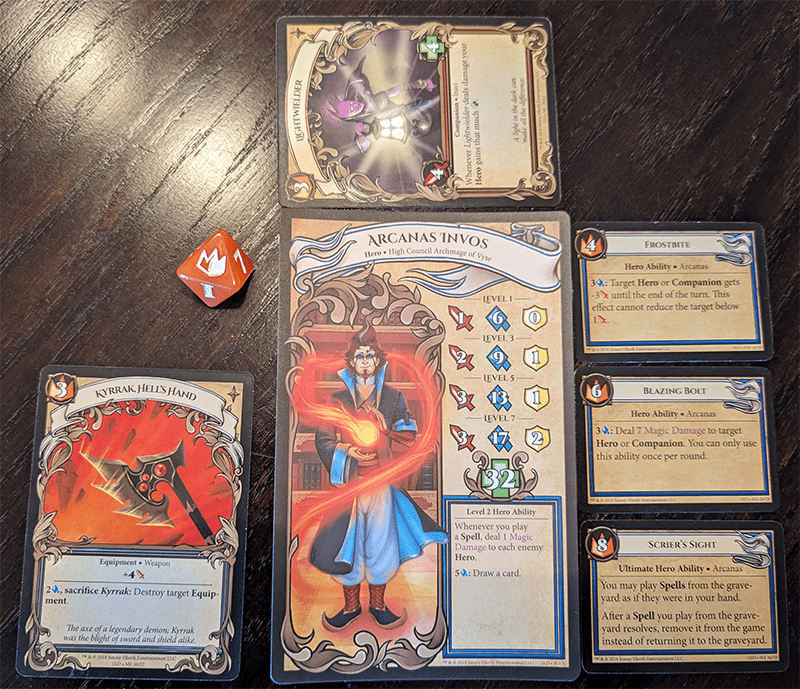
One Deck To Rule Them All
Hero is an attempt to emulate the experience of card battlers in a digestible package without the collectible card detritus. Inspirations from other games are obviously tattooed into this game’s design, and I’m not going to chastise the designer for doing this. Some of my favorite games are reinterpretations of others, such as Captain’s Gambit being a reimagining of Coup.
The plot here is as basic as it gets. You are a powerful individual who can wield legendary equipment, summon companions to your aid, and cast spells to manipulate reality. However, your opponent can do the same things, so you must prove your superiority by killing them before they can kill you!
The first decision you will make is to choose a character. There are five characters here, each with their own traits such as attack power, armor, mana, and abilities. Unlike many other games of this type, you are an active participant in this fight and are not afraid to get your hands dirty. After selecting your character, draw five cards from the deck, and you are ready to go.
At the start of the first player’s turn, everyone will level up. This will not only increase your stats but also unlock new abilities for you to use. The maximum level is 8 and the 8th-level abilities are incredibly powerful, as if the game is subtly suggesting that you and your friends should finish the game.
Mana Screw Not Found
Your character level is not only used for stats or abilities; it is also a resource for you to play Companion and Equipment cards. Companions are creatures that will take hits for you and give hits to your opponents with their own abilities. Equipment cards are attached to your character to make them more powerful.
Your level determines what cards you can play from your hand. For example, if you are level 4, you can play a single level 4 Companion or a single level 2 Equipment and a single level 2 Companion. There is no limit on how many Companions and Equipment cards you can have on the field. Mana is used to cast spells or activate abilities. As long as you have the mana to pay for it, you can cast it. Before you ask, yes there are spells that can be played outside of your turn to interrupt your opponent’s actions.
If this sounds similar to Hearthstone, you would not be wrong. The concept of having resources automatically regenerate and increase each turn is a great system. If you are going to borrow ideas for your games, borrow the good ones.
This doesn’t mean you can simply import your experiences from games like Hearthstone and Magic: The Gathering here. If you attempt to do so, you will be more humiliated than a wannabe comedian on open mic night. Without exaggeration, Hero is one of the most aggressive card battlers I have encountered.
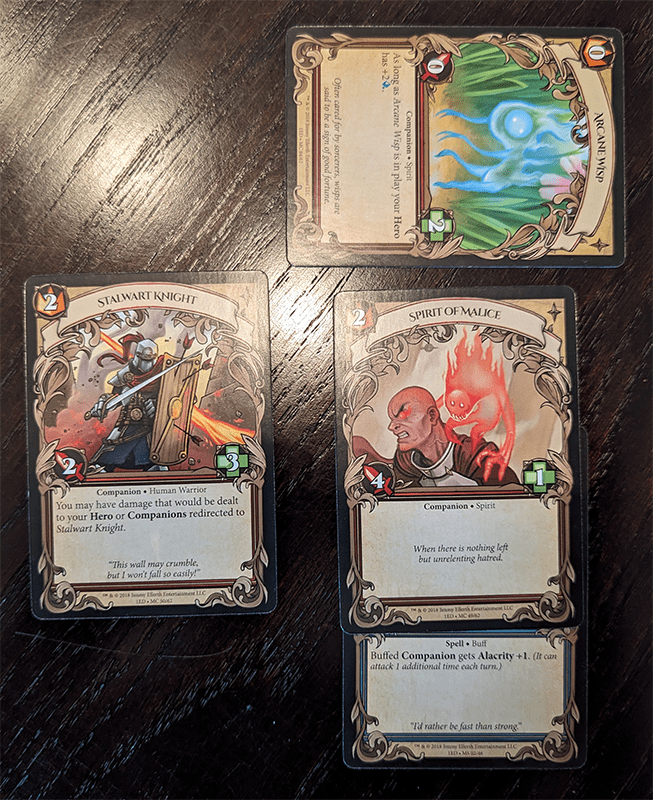
Haste Makes Paste
The first indication of this is the Companions. When you summon a Companion onto the field, it can instantly attack. There is no “summoning sickness” or fatigue here. Your character can even attack on the first turn of the game. If that sounds unbelievable, we’ve only just begun.
When you attack with your Companion, the defending target cannot retaliate. It may have blockers to absorb the damage before you reach the target, but that is all. You can only assign blockers at the end of your turn, and in a strange twist, Companions that attack can still be used to block.
I’m sure this is giving quite a few veteran collectors of collectible cards a cardiac arrest, but surprisingly, it works excellently. Hero encourages players to sprint towards the conclusion rather than running a marathon. In the dozen games I’ve played for this review, I only reached level 8 once and my two player matches were around 20 minutes. This is not a lengthy experience.
Some people may worry about drawing cards from a shared deck instead of personalized decks, but I can assure you that the cards are well-designed. You will experience a mix of frustration and joy as you examine your powerful options, yet can only choose a few – like having six children and picking one or two as your favorites. This requires a different mindset to appreciate, and it won’t suit everyone – but that’s alright.
I must also admit that I am quite taken with the art direction here. The game designer also did the art, and it is evident that the cards are meant to represent pages of a book. This is not too surprising since the packaging itself looks like a tome, inviting you and your friends to create stories of great beasts, powerful spells, and legendary items clashing together. However, this is not a perfect story, and there are a few parts that left me paralyzed with confusion.

Weird Card Draws
The first one that stumped me is the purple Quest cards. There are five of them in the deck and whenever one shows up, you have to resolve the text. These are “event cards” meant to spice up the game. Instead, it kills the pacing and feeds it to the pigs. I understand the intention behind this system, but it feels so unnecessary. Card battlers are already random, and adding another layer of randomness for “replayability” intentions doesn’t help. It actually becomes a problem when some of them can mess up your game in a negative way.
I removed Quest cards after a few games, but I cannot do the same for the first player advantage. There is no way to compensate players who start later in the round, which goes against card battler design tradition. As I mentioned before, level 8 abilities are meant to end the game, but the first player gets to do that first. It’s like the Black vs White situation in Chess.
The best solution would be to play more than two people, as advertised on the box, right? Don’t do this. Don’t play this game with four or five people. If you are threatened at gunpoint, take the bullet.
Hero claims to be a “battle royale” in multiplayer games, but it fails to deliver. Unlike Epic the Card Game or Eternal: Chronicles of the Throne, Hero allows players to attack anyone, leading to the “punch the leader” problem and making the game more social than tactical. As a result, the game quickly becomes tedious and tiresome.
That’s not exactly a new observation and this is compounded worse by some of the abilities that simply don’t scale well with the number of players. There is a particular character, Scathtassia, that gets health every time a Companion enters the discard pile. In a two-player setting, this is fine. Five players? You are marked for death and you will be the first to die. Not fun.
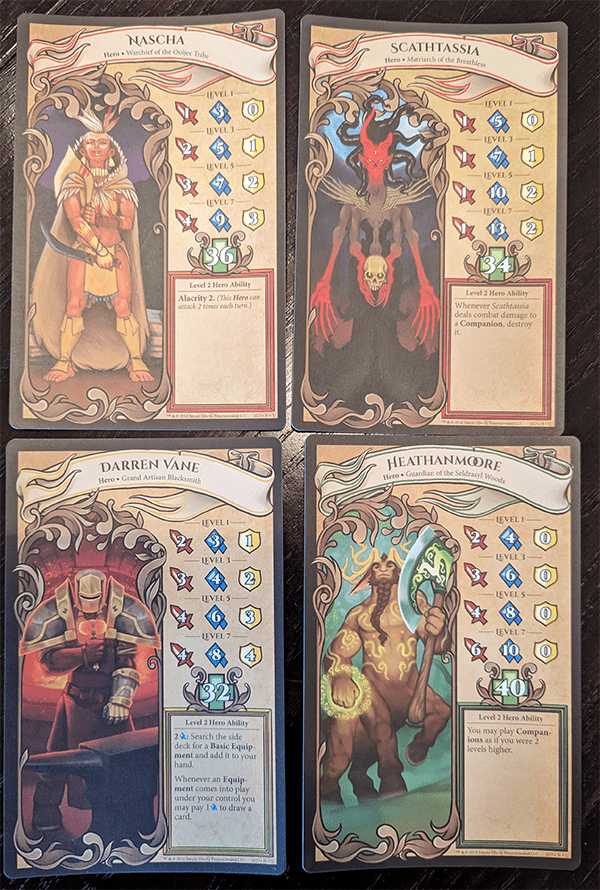
Druid Nonsense
Since I’m ranting about character design, let’s talk about Heathanmoore. This centaur’s game plan is to throw as many Companions at the enemy as possible. His abilities buff his Companions and heal him. Everything revolves around the number of Companions he has. I’m not saying he’s broken, as I have beaten him several times, but I am saying he’s boring to fight against and play with, as his strategy is more linear than a one-way road.
It surprises me to declare that statement because the four other characters are fantastic.
My favorite is Darren Vane, an equipment-focused hero that gets ludicrously strong and becomes a one-man army in the later stages of the match. His aggressive counterpart, Nascha, wants to end the game as early as possible. Give her a high-damage equipment card, and she evolves into a human chainsaw carving through flesh like she is Grace Jones in a Conan movie. The challenge with these two characters is you must budget between putting on the equipment and summoning companions on the field.
If equipment isn’t your thing, Arcanos Invos is your magic man. He has so much mana that he can conjure chaos on the field with ease as if he opened up a dozen Pandora boxes at once. Since spells are one-time use, timing is key here. Scathatassia is all about the end game. At first, she appears weak, yet her ultimate ability almost gives her a borderline auto-win on the 8th round. It might sound busted, but it creates an interesting dynamic where you must make hasty unoptimized decisions to make sure it doesn’t reach that deadly point.
The Final Draw
Hero deserves praise for attempting to cater to a niche audience that mainstream publishers and designers would not dare to try. A card battler’s appeal is crafting your own deck and discovering powerful combos from your opponents. Hero completely changes this tradition by introducing a highly aggressive combat system at a roadrunner’s pace sprouting from a shared deck. It works, although it may not be for everyone. This is a tactical game where strategy takes a backseat with a lollipop stuck in its mouth.
Yet there is also a part of me that wishes I can take the world’s largest sandpaper and smother this game with it. I don’t mind a few rough edges, but there are a few areas that make no sense to me. It doesn’t work for more than three players, one of the characters is not that engaging, the Quest cards feel out of place, and the first player advantage is obvious.
I still find this game far better than most of the options out there when it comes to short-form card battlers. I prefer it over Epic the Card Game, Shards of Infinity, and the Realm series of deckbuilders. If your friends know a bit about card battlers, it only takes a few minutes to teach them and a minute of your time to set up the game. Hero packs an unexpected, powerful punch in a small package, just like a good vodka.


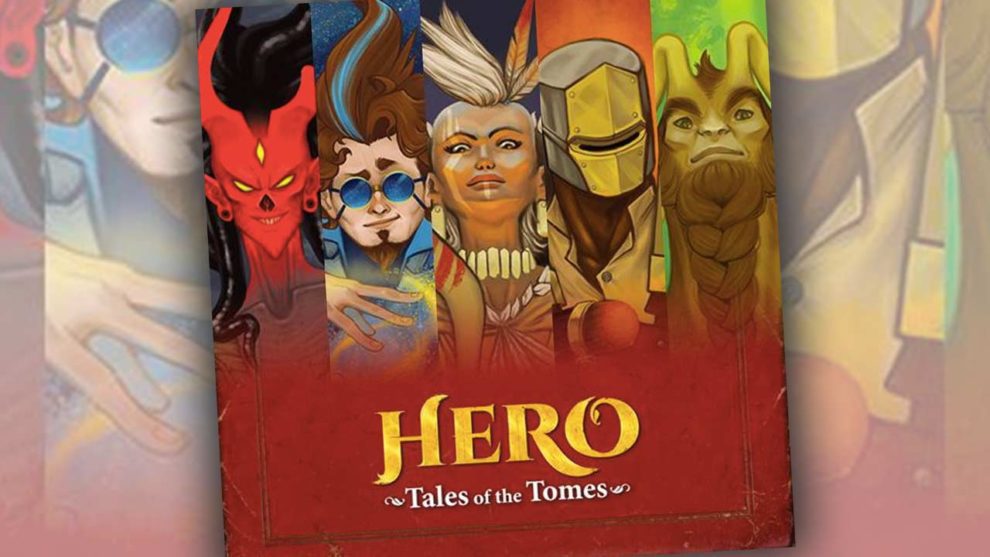
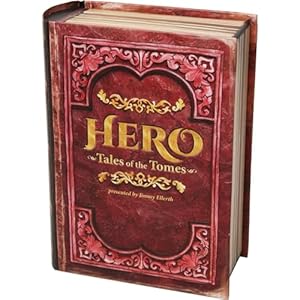


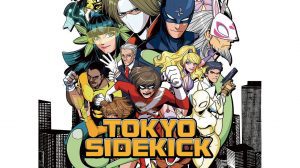
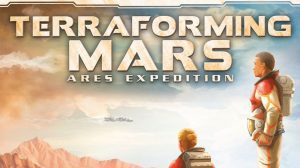




Add Comment